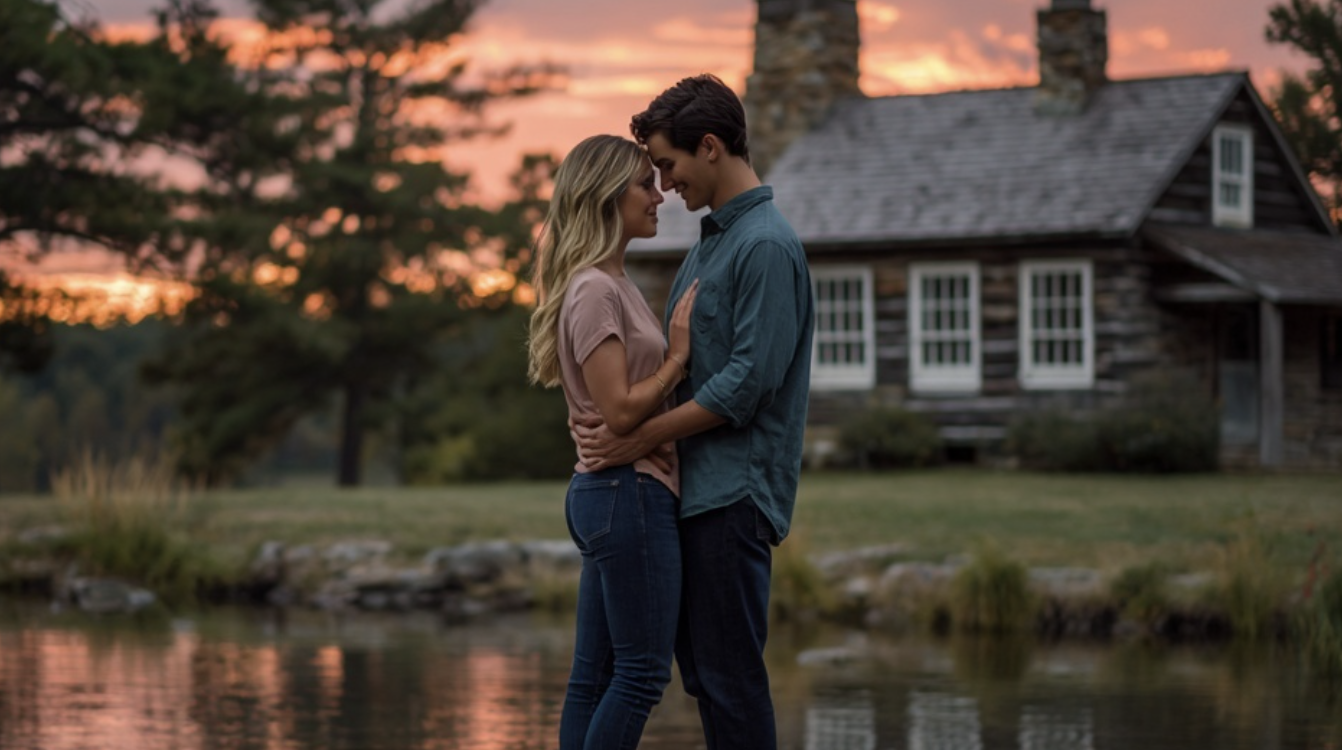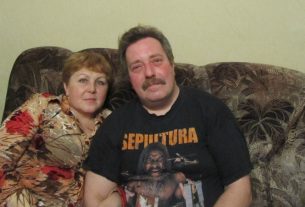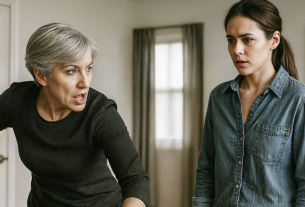The stifling city air felt especially suffocating to Alice the day the letter arrived. The envelope was yellowed with age and smelled of the sea, of salt, and of something elusively familiar—the scent of childhood. With trembling fingers she opened it and read the lines written in a neat, old-fashioned hand. Grandma Sofia was leaving her the house—the very one by the deep blue sea where the best summers of her life had passed.
Alice’s heart began to race, joy mingling with sorrow. She could almost feel the hot sand under her bare feet, hear the surf, and sense her grandmother’s gentle hands, always greeting her at the threshold.
She called Mark immediately. His voice through the speaker sounded distant and a little irritable, as if she’d torn him away from something very important.
“Mark, I need to go,” she began, trying to sound firm while bracing herself for his reaction. “Grandma… she left a will. I’ve been given that house by the sea.”
There was a second of silence on the other end.
“The house? The rickety, half-ruined one?” he asked, a hint of mockery in his tone.
“It isn’t rickety!” Alice flared at once. “It’s old, big, full of history. You remember, I spent every summer there. My parents sent me off without a worry because Grandma Sofia adored me and kept a sharp eye on me. She even took me to the sea by the hand when I was little. And later, when I grew up, I’d run there with the neighborhood kids. Oh, we had our fill of the sea! We’d pack sandwiches and fruit and be gone all day, till dusk. Sun, waves, laughter…”
“And for how long?” his dry, businesslike voice cut her off, yanking her back into the muggy city.
“I’m not sure, but definitely not just three days,” she sighed. “I need to take a look around and put things in order. I haven’t been there in ages. The last time… was my second year at university. And it’s been three years since I graduated and started working. I’ll take vacation and go. And you…” She paused, pouring all her hope into the words. “You could come later. It’s only a day’s drive. Leave early in the morning—you’ll be here by evening. Take a couple days off, unpaid if you have to, and we’ll rest. By the sea.”
“Can’t say I’ve been missing the sea,” came his listless reply. “Fine, I’m not promising, but I’ll see how work goes…”
Those words hung heavy in the air. He would “see.” Just as he always “saw,” and in the end stayed in the city, immersed in his business, which was always more important than she was.
Three days passed. Alice packed her suitcases; her heart fluttered with anticipation and with the secret hope that Mark would change his mind, come, drive her to the station, kiss her goodbye, and say he’d miss her. Instead, three hours before the train, his call came.
“Alice, sorry, I can’t drive you. Urgent work. You can manage a taxi, right?” he said, and she caught a false note in his voice.
“Of course,” she answered, a lump of hurt rising in her throat. “Don’t worry.”
She called a taxi and, settling into the back seat, stared out the window without seeing the streets flashing by. The city saw her off with a gray, indifferent gaze. And then… her heart dropped and stopped. At a traffic light stood his car. And not just stood. Mark—her Mark—was gallantly helping a young, slender woman in a light summer dress out of the passenger seat. They smiled at each other; he said something, and they headed into a cozy café on the corner.
“Oh—please, stop here!” burst out of Alice; her voice trembled. “I’ll pay for the wait—I have to get out!”
She jumped from the car, not feeling the ground under her feet. A hot wave of anger and pain surged to her throat. She flung open the café door and froze on the threshold. They sat at a window table, bent over a single menu, their fingertips almost touching.
“Hello,” her voice rang out, cold and crystalline as ice. “I can see you truly are incredibly busy. I have only one thing to say—goodbye. And don’t call me again. Ever.”
She turned and walked out, not giving him a chance to say anything. She didn’t see his bewildered face or hear her name as he shouted after her. She was already racing back to the taxi, fists clenched so tightly her nails bit into her palms.
All the long way—first the taxi to the station, then the stifling third-class sleeper car, then another taxi down country roads—she sank in a whirlpool of rage and despair. A roaring filled her ears as she replayed the scene again and again: his smile not meant for her, his solicitous gestures. Traitor. Liar. Nothing.
The taciturn, surly driver finally stopped at tall wrought-iron gates overgrown with wild grapevine.
“We’re here,” he muttered.
Alice paid and hauled out her suitcases. The driver called after her, “Give me a shout if you need…” Then he gunned it, leaving her alone before the gates, behind which stood her new, old house.
The silence was deafening. The air, thick and sweet, smelled of wormwood, the sea, and the dust of bygone days. She pulled out the heavy ring of antique keys—her grandmother’s gift—and, after some fumbling, found the right one and slipped it into the rusty padlock. It yielded with a dull click that sounded like a shot announcing the start of a new life.
The heavy gates creaked open, and Alice paused on the threshold. The yard was neglected. Grandma’s flowerbeds were overrun with exuberant perennials blooming in defiance of everything, a reminder of former coziness. Grandma Sonya had planted flowers every spring, and all summer the yard had been redolent with incredible scents. Now it was early July, the heat was unbearable, and the air quivered above the ground.
She walked up to the oak front door. The lock took work; time and neglect had stiffened it. At last the door opened with a weary sigh.
Silence. Tomb-still, unnerving silence greeted her inside. No scent of pies, none of the fragrant herbs Grandma always dried in the attic. Alice stopped in a spacious hall with a ceiling soaring up toward the sky. The house was old, its walls remembered her great-grandmother and great-grandfather.
In the center of the hall a broad staircase rose to the second floor, its handrails carved in intricate patterns—the very ones she’d loved to lick as a child, to her mother’s scolding. Above the stairs hung a tall arched window with panes of stained glass—blue, crimson, emerald. The rays of the setting sun slipped through them, casting on the scuffed parquet strange, almost living patches of light.
“Yes, it’s all mine now,” she whispered, her voice booming in the emptiness. “Thank you, Grandma. Now I have my own house. And my own sea.”
She moved from room to room, her fingers brushing furniture buried under a thick shroud of dust. Here was the living room with its enormous fireplace where she and Grandma had roasted potatoes on winter evenings. Here the dining room with a massive oak table and high-backed chairs. She went to the old dark-wood sideboard. Behind the glass, as before, stood the antique porcelain Grandma Sofia had loved to handle and carefully wipe with a special chamois cloth.
Alice gently opened the door and took out one of the cups. The porcelain was as fine as eggshell, almost transparent, painted in cobalt. She turned it over and saw on the base a gold inscription: “1890.” Goosebumps ran over her skin.
“That’s a small fortune,” she whispered, setting the fragile treasure back. “And Grandma just… used it every day.”
She’d never noticed, never grasped the value of this world. As a child it had been simply the backdrop of life. Now she saw it: the furnishings were pre-revolutionary, museum-worthy. And all of it belonged to her.
Suddenly there was a loud bang upstairs. In the oppressive stillness the sound was so sharp and loud that Alice started and turned. Probably a window. A draft. Her heart beat faster. She climbed the stairs slowly, listening. There were three rooms on the second floor. She checked them all—quiet, empty. But in Grandma’s bedroom a lump rose in her throat again.
The bed was huge and splendid, with carved oak posts holding up a canopy of worn silk.
“This is where Grandma slept,” Alice thought. “And I was in the next room. How I loved to run to her at night if I had bad dreams and burrow under her down quilt. She was so warm, so safe…”
She opened the wardrobe’s big door. It smelled of lavender and old time. Grandma’s dresses hung there—neat, sober, made of natural fabrics. Deciding she’d sort it all later, she took a running start and flopped onto the bed. The springs sighed; a cloud of dust rose into the air.
At that moment a loud, insistent doorbell and the clang of a metal knocker sounded.
Alice’s heart leapt to her throat. Who could it be? She went downstairs and, sliding back the heavy bolt, opened the door.
On the threshold stood an older woman with a kind but tired face.
“Hello, Alisenka,” she smiled. “Do you recognize me?”
Alice peered closer and, through the web of wrinkles, recognized her neighbor—Aunt Anya, mother of her childhood friend Vera.
“Aunt Anya! Hello! How did you know I was here?”
“I was walking by and saw the gate wasn’t locked. Means the lady of the house is home. I’ve been looking in on the place—your Grandma Sofia asked me to, while she was still alive. And my Verochka…” The woman sighed. “She married in a hurry and moved to another city. It’s just me and my son now. Do you remember Zakhar? The older one.”
Alice nodded. Oh, she remembered Zakhar—the older brother who had seemed so grown-up and unattainable to them girls. He’d left town when she was still a teenager.
“Well, he split up with his wife and came back to me—been living with me two years now. If you need anything, just ask. Are you staying long?”
“I don’t know yet, Aunt Anya. I’m here on vacation.”
“All right then. Come by if you need anything. And Zakhar will help too—he’s a man, he can hammer and fix things…” She looked closely at Alice. “And you, Ks… Alice—the older you get, the more you look like your grandmother Sofia. The spitting image. A real beauty,” the neighbor said, shaking her head, and, saying goodbye, left.
Alice spent the rest of the day bustling about, trying to bring the kitchen into order. The house was enormous, and dust lay everywhere like a thick shroud. By evening she was exhausted and remembered she needed to eat. She had to go to the supermarket, fortunately not far away.
She came back with bags, admiring the sunset. The sky blazed crimson and gold, the fire mirrored in the sea’s calm, glassy surface. The view was stunning, mesmerizing. Her hand reached for her phone to call Mark and share the beauty. But pride—and a fresh, still-bleeding wound—made her put the phone away.
“Brilliant idea, calling him,” she said to herself with a bitter smile. “Forget him. For good.”
Darkness fell quickly, southern-style. Alice went up to the bedroom. She decided to sleep in Grandma’s bed. The room was spacious, with a huge window facing the sea. She switched off the light and sank onto the soft, springy mattress, lost in a pile of pillows. She left the night-light on—being alone in this vast, creaking house felt unfamiliar and a little eerie.
She fell asleep almost instantly, felled by fatigue. And she dreamed that someone gentle and tender was stroking her hair and tucking in the blanket. The touch felt so real that she wanted, even in sleep, to open her eyes and look—but the sleep was too deep. Then Grandma Sofia appeared in the dream. She stood by the bed, smiling her wise, kind smile, and said quietly but very distinctly:
“Alicenka, make the right choice, my dear…”
And she was gone. Alice woke with the feeling that someone was in the room. She sat up and listened. Nothing. Only the sound of the surf drifted in from the sea. “What choice?” she wondered, but the dream was already dissolving, giving way to reality and a heap of tasks ahead.
In the morning her eyes fell on the huge crystal chandelier hanging in the center of the room. It was cloaked in cobwebs and dust, and cleaning it seemed impossible. She went to the neighbors.
“Aunt Anya, hello! Do you know how Grandma used to wash that chandelier? I don’t even know where to start.”
“Oh, the chandelier!” the woman threw up her hands. “All right, Zakhar should be back from the garage any minute. I’ll send him over with a step ladder.”
While Alice finished tidying the living room, wiping the carved mantel shelves, the doorbell rang again. It was him—Zakhar—on the threshold. She didn’t immediately recognize in this tall, broad-shouldered man with a weathered face and laughing brown eyes the older brother she remembered. He had changed, grown into himself; there was firmness in his gaze and smile lines at the corners of his mouth.
“Hi,” he smiled, his voice rich and warm. “I’m guessing you’re the Alice who used to steal all our apples from the garden?”
She laughed—unexpectedly, even to herself.
“Hi! Guilty as charged. And you must be Zakhar?”
“Bull’s-eye!” He stepped inside, carrying a folding ladder. “Well then, show me the battlefield.”
“Here she is—the beauty,” Alice pointed to the chandelier. “I have no idea what to do with it.”
“Oh yes, I remember that one!” Zakhar whistled in admiration. “Baba Sonya always scolded us when Vera and I played ball in here—afraid we’d hit the chandelier. Give me a damp cloth; I’ll climb up and wipe, and you can rinse and hand them up to me.”
They set to work. From below, Alice passed him fresh cloths, admiring how deftly his strong but careful hands moved among the crystal drops, which began to wake and sparkle as the century’s dust vanished. Zakhar cracked jokes, recalled funny childhood moments, and for the first time in years the house filled not with creaks and whispers of the past, but with bright, living laughter.
When the chandelier shone at full strength, scattering sunlight into facets, he climbed down and inspected their work with a critical eye.
“There now—gorgeous! We did well. What’s next? What are your plans for the day?”
“Cleaning. The whole second floor is left.”
“How about I help?” he offered, unexpectedly. “Otherwise you’ll be at it till nightfall alone.”
“Oh, Zakhar, are you sure? It’s a whole day’s work.”
“What’s so hard about helping a neighbor? Just the thing. And then, if you like, we’ll dash down to the sea. I’ve got the day off. Remember how you and Vera used to tail me, and Baba Sonya wouldn’t let you go without her?” He laughed again—contagiously.
They spent the whole day together. Zakhar turned out to be wonderfully handy and energetic. He didn’t just help; he did everything with a practiced touch: shifted a monster of a dresser, washed the windows, fixed a squeaky door. Alone, she would have finished deep into the night; with him, by four o’clock everything sparkled and smelled clean.
“Alice, I’m hungry as a hundred wolves,” Zakhar announced, washing the grime from his hands. “Got anything to eat?”
“I bought some pelmeni yesterday—they’re in the freezer. That’s it; as you can see, there was no time for shopping.”
“Oh, forget the pelmeni!” he waved it off. “How about we hit a café? There’s a decent one in the settlement. I’ll pop home, clean up, and off we go.”
“Let’s!” she agreed happily. “I’ll grab a quick shower too.”
They finally ate at the café. Zakhar laughed, telling amusing stories from his life.
“See? And you said it was boring here! Life feel a bit livelier now? After we eat, shall we run down to the sea? The water’s warm as fresh milk. For now, how about a walk?”
They strolled along the promenade, then went down to the beach. In the evening there were few people, and the water really was unbelievably warm and gentle. They swam, talked themselves out, joked. Zakhar walked her all the way to the gate and, saying goodbye, left.
Alice went up to the bedroom, pleasantly sore and feeling a light, bright happiness she hadn’t known in a long time. She flopped onto the bed, ready to drop off, when the phone rang. Her heart skipped. Mark.
She picked up. His voice sounded syrupy and contrite, as if nothing had happened.
“Hi, Alice! How are you? How’s the house? Is the sea far?”
“Hi,” she said, her voice turning to ice. “I’m doing great. The house is right on the shore. Why do you ask?”
“I miss you,” he whined. “I’m planning to come over. Send me the exact address.”
Alice closed her eyes. Zakhar’s face sprang up before her—open, honest, smiling. And Mark’s face in the café with that girl. And Grandma’s voice from the dream: “Make the right choice.”
“Keep dreaming,” she said quietly but very clearly. “Don’t even think about it. Traitor. I don’t want to see you. And don’t call again. Say hello to your new flame.”
“Alice, wait! Don’t hang up! It’s not what you think! Please forgive me!” he was almost shouting.
“Mark, it’s over. I’ve said all I had to say. Don’t call.”
She switched off the phone, knowing he’d keep ringing all night. She set it on the nightstand and lay down, staring into the dark. And then it finally came to her—like a bolt of lightning. Grandma had meant the choice—not between the city and the sea. Not between work and vacation. But between past and future. Between lies and betrayal—and something new, pure, and real that was only beginning to take shape.
She had made her choice. And for the first time in a long while, she fell asleep with a peaceful smile. She dreamed of the sea. And of Zakhar.
Time passed.
Alice didn’t just put the house in order—she breathed new life into it. She moved there for good, found a job in the nearest city; modern technology made remote work possible. The old house sounded different now: the creak of the floorboards was drowned out by laughter; flames danced in the fireplace again; the kitchen smelled of fresh baking.
She married Zakhar. There was no lavish wedding—just a quiet, heartfelt celebration here on the terrace, with the sound of the surf. They lived in the big house happily and in great harmony. Zakhar turned out not only to be a jack-of-all-trades, but a loving, attentive husband.
And now the two of them stood on that very terrace, gazing at the moon laying a silver path on the water. Alice’s hand rested on the barely noticeable yet already so important and beloved swell of her belly. They were expecting a baby. Their baby.
She looked at the sea and the stars, felt the warmth of her husband’s hand at her waist, and thought of Grandma Sofia.
“Thank you, Grandma,” she whispered. “For your house. For your legacy. And for helping me make the right choice.”
Somewhere deep in the house, as if in reply, a crystal pendant on the clean, shining chandelier chimed softly against the shelf.



